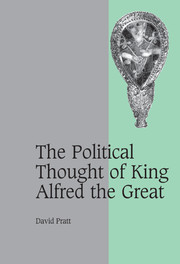Book contents
- Frontmatter
- Contents
- Acknowledgements
- List of abbreviations
- Note on citations
- Chapter 1 INTRODUCTION
- Part I The West Saxon Political Order
- Part II Alfredian Discourse and its Efficacy
- Appendix: West Frankish deployment of Solomon's dream
- Bibliography
- Index of manuscripts
- General index
- Cambridge Studies in Medieval Life and Thought Fourth Series
Chapter 1 - INTRODUCTION
Published online by Cambridge University Press: 06 July 2009
- Frontmatter
- Contents
- Acknowledgements
- List of abbreviations
- Note on citations
- Chapter 1 INTRODUCTION
- Part I The West Saxon Political Order
- Part II Alfredian Discourse and its Efficacy
- Appendix: West Frankish deployment of Solomon's dream
- Bibliography
- Index of manuscripts
- General index
- Cambridge Studies in Medieval Life and Thought Fourth Series
Summary
Is there anything left to say about King Alfred? In part, the question is misconstrued: every age has reinterpreted his ninth-century memory. In his own lifetime Alfred's rule was celebrated in vernacular history and Latin biography; selectively revered in the later Anglo-Saxon period, his reign was partly eclipsed by the reputations of Æthelstan and Edgar. Only in the later middle ages was Alfred singled out as a possible founder of ‘English’ political and administrative unity. The momentous account of Alfred's viking warfare, and successful extension of West Saxon rule, combined with a natural tendency to schematize jurisdictional uniformity. It was on this basis that Alfred was first styled ‘the Great’: for Matthew Paris his reign had been pivotal in replacing a former ‘Heptarchy’ of seven kingdoms with rule over the whole of England. Only in the sixteenth century did this vision accord with political needs for a formative Alfredian past. In the learned recovery of several Alfredian texts, Elizabethan antiquaries found deeper origins for a united English church. Under Stuart and Hanoverian rule, those origins extended to English ‘liberties’, conveniently undermining the alternative schema of a ‘Norman Yoke’. By the early eighteenth century, such interpretations reached their climax in Alfred's status as acknowledged ‘founder of the English constitution’. The ‘Whig’ view in turn laid the basis for Victorian rituals of popular commemoration, enshrining Alfred as a symbol of ancient freedom and nationhood.
Modern reassessment has frequently wrestled with the baggage of retrospection.
- Type
- Chapter
- Information
- The Political Thought of King Alfred the Great , pp. 1 - 14Publisher: Cambridge University PressPrint publication year: 2007

